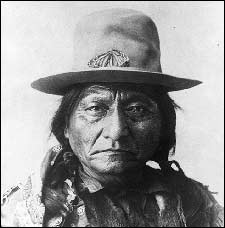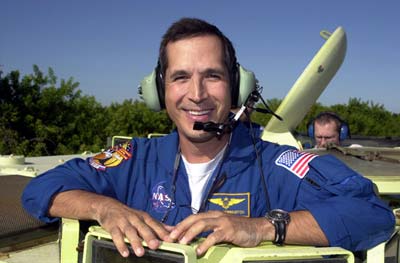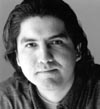 Another Stereotype of the Month entry:
Another Stereotype of the Month entry:
 Another Stereotype of the Month entry:
Another Stereotype of the Month entry:
From the Grand Forks Herald:
Posted on Tue, Nov. 02, 2004
DORREEN YELLOW BIRD COLUMN: On the 'Indianness' of Indians
On the day of the opening of the National Museum of the American Indian in Washington, D.C., I attended a press conference of the National Indian Gaming Association.
From my seat at the National Press Club in Washington, D.C., I could see media people, tribal officials and staff I recognized from the National Indian Gaming Association. There were others whom I thought probably were members of the association's staff.
It was then that I realized my knowledge of Indian tribes needed reorienting. The influence of Indian gaming probably is the reason I am seeing a new kind of Indian. For example, the tribal chairman from the Mashantucket Pequot, whom I saw at the press conference, looked black rather than Native American. His aide did, too.
I realize that for the past 20 or so years, I haven't gotten out much past Canada and the states surrounding North Dakota. The Indian people in this area usually are Dakota, Lakota, Nakota, Chippewa or from the Three Affiliated Tribes -- Arikara, Mandan and Hidatsa. And I absolutely know there are Native Americans who are mixed blood; I have blond grandchildren, for example. But these two Pequot men certainly turned my head when they walked into the room. Since that press conference, I have paid more attention to Indian gaming issues.
Have these newly recognized tribes arisen solely for federal programs and the gaming business?
During the press conference, the current chairman of the National Indian Gaming Association, Ernest Stevens Jr., applauded the success of the gaming tribes. Indian gaming has grown to a $16.7 billion industry and created 500,000 jobs nationwide, he said. Tribes have at their fingertips one of the greatest economic development tools in 200 years.
This success is a godsend for many tribes.
Six speakers from successful casinos were chosen to talk about the prosperity of their gaming endeavors. Thomas, the Mashantucket Pequot chairman, was one of the speakers. The Pequot run the very successful Foxwoods Resort Casino in Connecticut.
My question is, who are the Mashantucket Pequot? Were they really a tribe? I was unable to reach chairman Thomas by phone. Arthur Henic, the tribe's public relations person, answered my questions this way: The tribe was federally recognized in October 1983 during President Reagan's administration. Members who have lineage to the 1900 and 1910 census are considered part of the tribe, he said.
In the past few weeks, I've read a book titled, "Without Reservation: How a controversial Indian tribe rose to power and built the world's largest casino," by Jeff Benedict. It's about the Mashantucket Pequot.
It reads like a good novel. Benedict has an "inside their heads" narrative that I was a little put off by. But I was shocked, too, at his recounting of the bloody history of what happened to many Indians on the East Coast. It made me think how lucky some of the Plains tribes are. We weren't faced with as much outside influence.
Here is what Benedict's book says. After seeing the stark poverty and abuse in Indian country in South Dakota, a lawyer named Tom Tureen left that state and took a job with Indian Legal Services in Calais, Maine. There he worked with more than 1,500 Passamaquoddy, "who wallowed in extreme poverty on a vast wilderness reservation," as the book describes.
Tureen wanted to help the Passamaquoddy become federally recognized so they'd be eligible for federal programs. In his research, he found that other coastal tribes might be eligible for federal recognition, too, thanks to the 1790 Nonintercourse Act.
Tureen's people contacted all tribes that seemed to fit the category of a tribe. In his search for other tribes, Elizabeth George of the Mashantucket Pequot was identified. She lived on 214 acres with a wooden sign that read, "Western Pequot Indian Reservation, established 1667."
She defended her land in Ledyard, Conn., for years from outsiders and with a shotgun.
On first glance and because George lived on land identified by the state as a reservation, it was assumed she represented a tribe.
Enter Richard "Skip" Hayward, her grandson. At the time, neither Hayward nor any of George's other relatives had an interest in the reservation, and all of them identified themselves as white, according to Benedict's book.
But when they were approached about the lawsuit for land and federal programs, Hayward, who was elected chief, pulled together his family and anyone else who could tie themselves to the Mashantucket Pequot, the book says.
Over the next 30 years, the reservation grew to 2,000 acres and 600 people claiming to be Pequot. Their Foxwoods casino grosses more than $1 billion a year.
There is a murmuring in Indian country about tribes who, it seems, have jumped on the bandwagon because federal benefits and, more recently, casino wealth.
So it twisted my gut a little when I saw Thomas boasting about their Indian gaming successes. In some parts of Indian country, a word used to describe these tribes is "opportunists," not Indian people trying to regain a culture and language. That word crosses my mind on occasion, too. And I still have questions about the federal government and Congress' role in granting federal recognition.
From the Grand Forks Herald:

Posted on Sun, Nov. 14, 2004
Columnist shows contempt for diversity
LARIMOIRE, N.D. -- DAYVILLE, Conn. -- Herald columnist Dorreen Yellow Bird should be ashamed of herself. Her antagonistic skepticism regarding the "true identity" of Indians, implying that my own tribe's chairman lacks enough Indian blood to be accepted in Yellow Bird's racial-profiling, inadvertently condemns the lineage of her own so-called "blond grandchildren".
What is wrong with this woman? Does she not comprehend that by embracing the racial blood quantum ideology that Native Americans have argued against the federal government for decades, she actually contributes toward the ignorant, racist sentiment that perhaps one day, American Indians will be extinct? If he were alive today, perhaps Gen. George Armstrong Custer would speak highly of Yellow Bird.
What exactly does Yellow Bird believe is the true measure of an Indian? Is it how you look, dress, speak, sing, braid your hair and provide for your family? Or is it that ancient link to a continuous community of culturally connected clans that just so happened to have existed on this continent before the to first contact of Europeans?
Indian tribes across the country certainly are caught in a struggle to maintain identity, culture and unity while being influenced and encouraged to keep up with the modern 21st-century American society. Is it not possible to have both?
Like Yellow Bird's grandchildren, I also have European ancestry. But I always have known that I descend from the Mashantucket Pequot people -- those who struggled to survive that first genocidal massacre attempt in North America; who endured decades of slavery and servitude; who were forced to dwell on the very first reservation in America; who struggled to hold onto land torn away by illegal government land sales; many of whom migrated away from our indigenous territory to find employment and who were prohibited by the state of Connecticut to move back on our reservation if and when they tried.
Jeff Benedict's book, "Without Reservation" (which Yellow Bird cites), is, like most works of fiction, based on some small facts. But what Yellow Bird fails to comprehend is that the sloppy geneological research and embellished sensationalism that this author used to attract as many anti-Indian consumers as possible was based upon his own greed to produce a best-seller.
My Pequot heritage is a long and proud one, and although our community appears abnormally diverse to Yellow Bird's contemptuous eyes, we Pequots cherish our precious roots here in Connecticut. Yes, we have diversities and problems just like any other tribal community in this country. However, I am confident that with or without a casino, we will continue to thrive. Money isn't everything, Ms. Yellow Bird.
Lori A. Potter
Potter is a member of the Mashantucket Pequot tribe.
Rob's reply
If the federal government recognizes a group of Indians as a tribe, it's a tribe.
A few postings shed light on Yellow Bird's doubts:
Pequots are about as Indian "as Camilla Parker Bowles"
Benedict: Schaghticoke, Eastern Pequot tribes are "bogus"
Jackpot book paints Pequots as fakes, money grabbers
Sioux Red Shirt says Eastern Indians aren't real Indians
Columnist thinks northern Plains is "real" Indian country


Benedict doesn't recognize any tribes in Connecticut and opposes any expansion of casinos, so his opinion of the Pequots is suspect. If he said another Connecticut tribe was legitimate and had a legitimate right to pursue gaming, his position would seem less biased.
Yellow Bird also thought California's tribes were phony until she met them, so her opinion of the Pequots is suspect. Whenever a tribe doesn't fit her Plains model, she seems to doubt it's real.
Related links
The facts about Indian gaming
|
. . . |

|
All material © copyright its original owners, except where noted.
Original text and pictures © copyright 2007 by Robert Schmidt.
Copyrighted material is posted under the Fair Use provision of the Copyright Act,
which allows copying for nonprofit educational uses including criticism and commentary.
Comments sent to the publisher become the property of Blue Corn Comics
and may be used in other postings without permission.